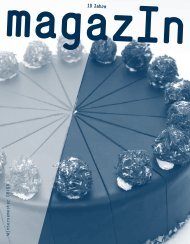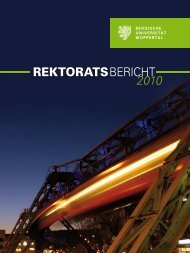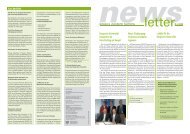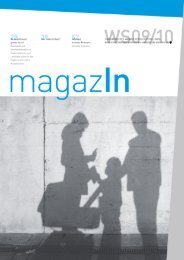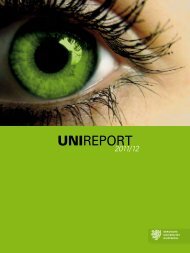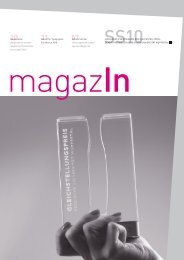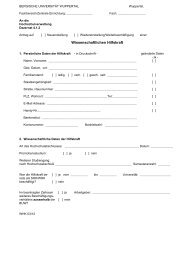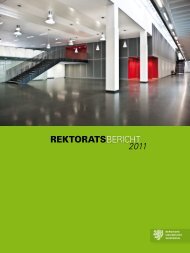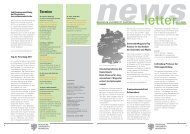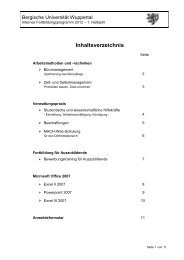international - Bergische Universität Wuppertal
international - Bergische Universität Wuppertal
international - Bergische Universität Wuppertal
You also want an ePaper? Increase the reach of your titles
YUMPU automatically turns print PDFs into web optimized ePapers that Google loves.
42<br />
Two generations of combined heat and power know-how at WSW: Volker<br />
Leonhard, Head of Energy Production, graduated in mechanical engineering<br />
from UW. His colleague Damian Seget recently completed a BSc in electrical<br />
engineering.<br />
WanteD by WUppertal mUniCipal Utilities:<br />
engineers maDe in WUppertal<br />
Many specialists em-<br />
ployed in the enginee-<br />
ring and technical divisions of<br />
<strong>Wuppertal</strong> Municipal Utilities<br />
(WSW) studied in <strong>Wuppertal</strong>.<br />
The knowledge and knowhow<br />
they gained at UW provided<br />
a solid foundation for<br />
their professional success.<br />
Ingmar Hentsch graduated<br />
from UW in 1999 as an electrical<br />
engineer specializing in<br />
drive control. After initial employment<br />
in the R&D department<br />
of an automotive industries<br />
supplier, he applied in<br />
2006 for the position of Head<br />
of the Meter Checking office<br />
at WSW. “Personal qualities<br />
and teamwork were required”,<br />
Hentsch recalls, and he<br />
mentions the supplementary<br />
training he had to do to qualify<br />
as a certified controller. “Important<br />
for me is the ability<br />
to analyze and solve complex<br />
problems. I need that every<br />
day”, he says – and that was<br />
also something he learned at<br />
UW.<br />
Volker Leonhard, Head of<br />
Energy Production at WSW,<br />
studied mechanical engineering<br />
at UW, graduating in<br />
1981. “It gave us an excellent<br />
theoretical basis”, he remembers.<br />
Asked what he likes<br />
about his job, he singles out<br />
the fact that “as a manager<br />
I am still very close to technological<br />
issues.” Damian<br />
Seget’s career has also<br />
brought an interesting combination<br />
of theory and practice.<br />
Until recently a trainee electrician<br />
at WSW’s combined<br />
heat and power generation<br />
plant in Barmen, he had already<br />
spent several years with<br />
his present employer before<br />
taking his BSc at UW in 2009.<br />
“University was certainly a<br />
sensible step”, he says. With<br />
a degree he has many more<br />
opportunities to apply for higher<br />
positions.<br />
As a civil engineer, Volker<br />
Berges is responsible for<br />
the coordination of construction<br />
activities in <strong>Wuppertal</strong>’s<br />
electrical power, gas, and<br />
water supply networks, and<br />
in the waste water system.<br />
Dr.-Ing. Christian Kindinger (Civil Engineering), Head<br />
of Transportation Management at WSW, values his<br />
contacts with UW.<br />
Although his main focus at<br />
degree level was structural<br />
engineering, his first job after<br />
graduation in 1986 was with<br />
a road construction company.<br />
This was followed by a period<br />
of general civil engineering<br />
before he moved to WSW in<br />
2002. “As a construction manager<br />
one needs not only specialist<br />
engineering knowledge<br />
but also communicative competencies<br />
and knowledge of<br />
people,” says Berges. “And<br />
one only learns that on the<br />
job.” Nevertheless, he would<br />
not want to have missed his<br />
years at UW: “The teaching<br />
offer there was very broad. In<br />
the end you may only need a<br />
fraction of what you learn, but<br />
you never know beforehand<br />
Dipl.-Ing. Ludwig Froning (Civil Engineering) came to <strong>Wuppertal</strong><br />
Dipl.-Ing. Ingmar Hentsch is passionate about electrical engineering. As Head of<br />
to study at UW’s Competence Center for Traffic and Transpor-<br />
the Meter Checking office he is keen to pass on his knowledge to the younger<br />
tation generation of engineers.<br />
02<br />
which fraction it will be.”<br />
Civil engineers Christian Kin-<br />
dinger and Ludwig Froning<br />
work in an entirely different<br />
area: municipal transportation.<br />
Majoring at UW’s Competence<br />
Center for Traffic<br />
and Transportation was, Froning<br />
says, the key to his career:<br />
“UW’s specialty in this<br />
field decided me to study in<br />
<strong>Wuppertal</strong>.” Graduating in<br />
1996, he spent five years in<br />
transportation and road planning<br />
before moving to WSW,<br />
where he is now responsible<br />
for planning bus and Schwebebahn<br />
(<strong>Wuppertal</strong>’s unique<br />
suspension monorail) services,<br />
and for the bus transport<br />
infrastructure. Kindinger,<br />
although a native of <strong>Wuppertal</strong>,<br />
admits that the Schwebebahn<br />
was not the reason for<br />
him to study engineering: “In<br />
early semesters I was fasci-<br />
nated by Alpine tunnel construction<br />
and saw myself rather<br />
as an underground engineer.”<br />
But after an internship with<br />
WSW he started as a trainee<br />
in 2003, working his way up<br />
into his present position as<br />
Head of Transportation Management,<br />
where he is, after<br />
all, also responsible for the<br />
Schwebebahn. Maintaining<br />
his links to UW, he completed<br />
his doctorate there in 2010.<br />
Carolin Schürmann and An-<br />
dreas Zafiratos are studying<br />
electrical engineering on<br />
UW’s new twin-track program,<br />
which means that<br />
alongside their degree program<br />
they have been employed<br />
in a perfectly normal way<br />
since fall 2010 as apprentice<br />
electronic systems technicians<br />
at WSW’s Technical operations<br />
Department. Far from<br />
scaring them off, the double<br />
workload is what appeals to<br />
them: “Employers expect<br />
university graduates to have<br />
practical experience, and our<br />
apprentice training gives us<br />
plenty of that.” And, they<br />
add, “if in the end we don’t<br />
manage the degree, we still<br />
have our trade qualification.”<br />
After two years’ training at<br />
WSW they will take their<br />
Chamber of Industry and<br />
Commerce exams. They are<br />
then granted an extra year to<br />
complete their bachelor’s degree,<br />
making four years in all.<br />
<strong>Wuppertal</strong> Municipal<br />
utilities – WsW<br />
Bromberger Strasse 39–41<br />
42281 <strong>Wuppertal</strong><br />
T: +49 (0)202 569-0<br />
E: wsw@wsw-online.de<br />
k www.wsw-online.de<br />
43



